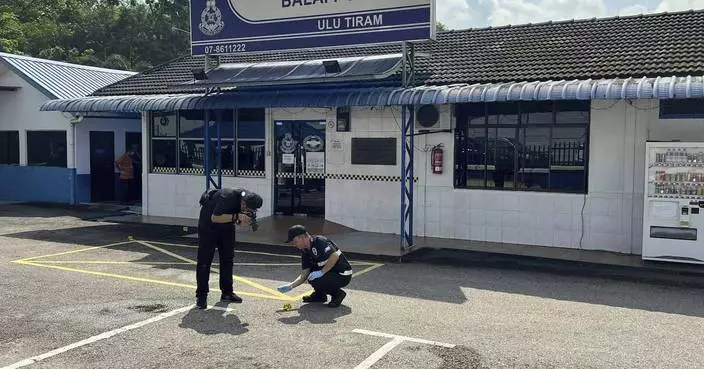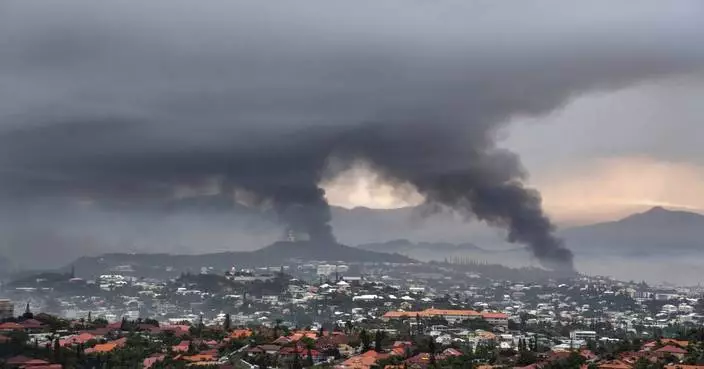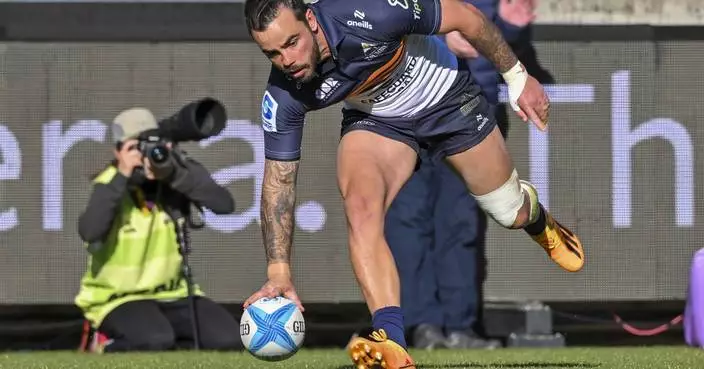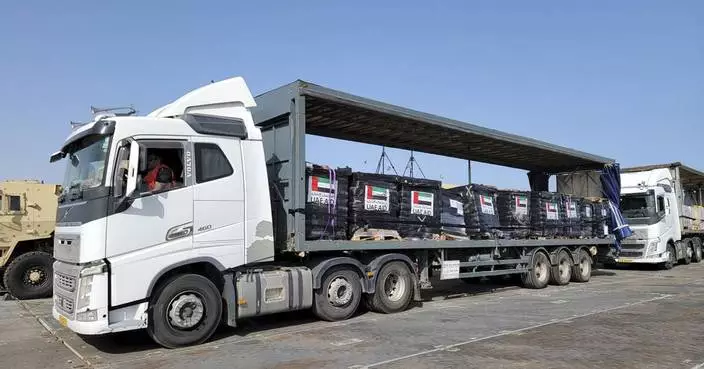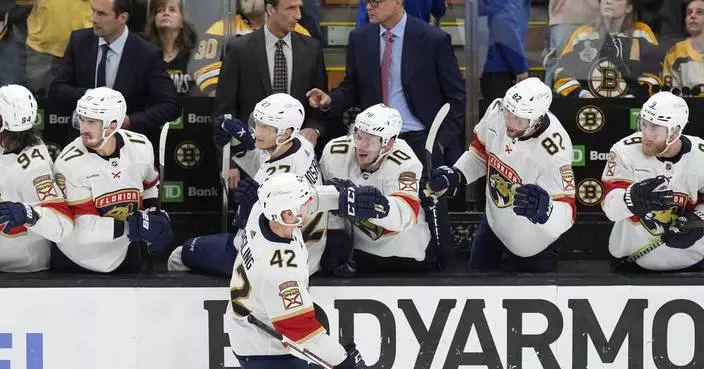The New York Rangers are well aware about the difficulties Presidents' Trophy winners have had in advancing in the Stanley Cup playoffs. They're just not thinking about that.
Since the award was first given to team with the highest point total during the regular season in 1986, only eight of those teams won the championship. Chicago was the last to do it in 2013, and the 2015 Rangers are the only team since then to advance beyond the second round.
“We don’t live under a rock," New York forward Mika Zibanejad said. “We know what has been happening to previous Presidents’ winners, but at the same time I don’t know if that’s the main thing that drives us.”
Captain Jacob Trouba echoed that sentiment, adding: "Things in the past or trends ... I don’t think our group really reads too much into them. We’re just trying to write our own page, our own story and that’s, I guess, the focus.”
The Rangers — seeking their first Stanley Cup title since 1994, when they also won the Presidents' Trophy — open the second round of the playoffs against the Carolina Hurricanes on Sunday at Madison Square Garden.
The Hurricanes have the best odds to win the Stanley Cup, according to Bet MGM Sportsbook, and the Rangers have the fifth-best.
Under the NHL's divisional-playoff format, this series pits the Rangers — the top regular-season team with 114 points — and the Hurricanes, who were three points back and third in the overall NHL standings.
“The Rangers were the best team and we were on their heels all year,” Hurricanes coach Rod Brind’Amour said. “Whether you play them in the first round or the second or third, you’ve got to get through the best at some point. So have at it now, I think it’s going to be exciting.”
The Hurricanes, who reached the Eastern Conference final last year, are in the postseason for the sixth straight year under Brind’Amour. Their win against the Islanders in the first round marked the first time a franchise has won at least one series in six straight years since Detroit did it from 1995-2000.
This also marks the first time the Hurricanes won’t have home-ice advantage for a postseason series since 2019, excluding games played in the bubble four years ago.
“Obviously you don’t get to start at home, which is always nice,” forward Seth Jarvis said. “But I think we have the same mentality of going in and trying to win, trying to start the series off on the right foot.”
The Rangers led the league with 30 wins at home, but both teams were solid on the road with 25 wins during the season — tied for third-best.
“You've seen teams lose games at home, win games on the road,” Trouba said. “Having home-ice is great but at the end of the day you’re gonna have to win games on the road at some point probably.”
New York forward Vincent Trocheck spent two-plus seasons with Carolina as a key two-way player before signing a seven-year deal with the Rangers in July 2022.
Hurricanes defenseman Brady Skjei spent parts of five seasons in New York before being dealt to Carolina at the trade deadline in 2020, and Tony DeAngelo spent parts of four seasons with the Rangers before he was waived on Feb. 1, 2021.
The Rangers were seventh in scoring (3.39 goals per game) during the season while Carolina was eighth (3.38). In the first round, the Hurricanes upped their average to 3.80 gpg, while the Rangers were right behind at 3.75.
Carolina had balanced offensive contributions throughout their lineup in the first round, getting goals from 12 different players — led by Stefan Noesen and Jarvis (3 each) — and points by 17 players.
New York had goals from 10 players against Washington — led by Trochek (3) — and 14 players had at least one point.
Frederik Andersen closed the regular season strong for the Hurricanes after missing four months due to a blood clotting issue. He alternated games with Pyotr Kochetkov in the final weeks, but he played all five games in the first round while posting a 2.25 goals-against average and a .912 save percentage.
Igor Shesterkin also finished the regular season strong for the Rangers while winning 10 of his last 14 starts, including three shutouts. Against the Capitals he had a 1.75 GAA and .935 save-percentage in the four-game sweep.
The Hurricanes ranked second in the regular season on the power play, converting 26.9% of their chances — slightly ahead of the Rangers in third at 26.4%. Carolina had the league’s No. 1 penalty kill at 86.4%, while the Rangers were third at 84.5%.
The teams had similar outputs with the man advantage in the first-round series (Rangers 6 of 16, 37.5%; Hurricanes 5 of 15, 33.3%).
This is the teams' third postseason meeting — all in the last five year. Carolina had a three-game sweep in the qualifying round of the 2020 playoff bubble, and New York won the deciding Game 7 on the road in the second round of the 2022 playoffs after the home team had won each of the first six games.
AP Hockey Writer Stephen Whyno and AP Sports Writer Aaron Beard contributed to this report.
AP NHL: https://www.apnews.com/hub/NHL

Carolina Hurricanes' Teuvo Teravainen, left, celebrates his goal with Seth Jarvis (24) during the first period in Game 5 of an NHL hockey Stanley Cup first-round playoff series against the New York Islanders in Raleigh, N.C., Tuesday, April 30, 2024. (AP Photo/Karl B DeBlaker)

Carolina Hurricanes celebrate a goal by Andrei Svechnikov during the first period in Game 5 of an NHL hockey Stanley Cup first-round playoff series against the New York Islanders in Raleigh, N.C., Tuesday, April 30, 2024. (AP Photo/Karl B DeBlaker)

New York Rangers goaltender Igor Shesterkin (31) makes a save during the third period in Game 4 of an NHL hockey Stanley Cup first-round playoff series against the Washington Capitals Sunday, April 28, 2024, in Washington. (AP Photo/Tom Brenner)

New York Rangers left wing Artemi Panarin celebrates with left wing Chris Kreider after scoring a goal during the third period in Game 4 of an NHL hockey Stanley Cup first-round playoff series against the Washington Capitals, Sunday, April 28, 2024, in Washington. (AP Photo/Tom Brenner)
RIO DE JANEIRO (AP) — A 20-minute drive separates the historic Maracana Stadium from the Complexo do Alemao, one of Rio de Janeiro's most impoverished and violent favelas.
One of its residents, 15-year-old soccer player Kaylane Alves dos Santos, hopes her powerful shots and impressive dribbles will allow her to cover that short distance from slum to stadium in three years to play for Brazil's national team in the final of the 2027 Women's World Cup.
That chance, once remote, became more realistic on Friday when FIFA members voted to make Brazil the first Latin American country to host the Women's World Cup.
Local organizers have suggested that both the opening match and the final are likely to be played at the 78,000-seat Maracana Stadium that staged the final matches of the 1950 and the 2014 men's soccer World Cups.
Teenager dos Santos knows the hurdles for her to ever play for Brazil remain enormous — in 2027 or later. She doesn't have a professional club to play for, she only trains twice a week, and her nutrition is not the best due to limited food choices in the favela.
Most importantly, she often can't leave home to play when police and drug dealers shoot at each other in Complexo do Alemao.
Still, she is excited and hopeful about Brazil hosting the Women's World Cup, resulting in a big boost to her confidence.
“We have a dream (of playing for Brazil in the Women’s World Cup), and if we have that chance it will be the best thing in the world,” dos Santos told The Associated Press this week after a training session in the Complexo do Alemao.
She and about 70 other young women in the Bola de Ouro project train on an artificial grass pitch in a safe region of the 3-square kilometers long (1.15 square mile) community.
If not on the pitch, Dos Santos and her teammates will be happy enough just to attend games of a tournament they could only dream of watching up close until FIFA members voted for Brazil over the Germany-Netherlands-Belgium joint bid. The Women's World Cup was played for the first time in 1991 and will have its 10th edition in 2027.
A five-time champion in men's soccer, more than any other country, Brazil has yet to win its first Women's World Cup trophy. By then, it is unlikely superstar Marta, aged 38, will be in the roster. Dos Santos and thousands of young female footballers who have overcome sexism to take up the sport are keen to get inspiration from the six-time FIFA player of the year award winner and write their own history on home soil.
As many female footballers experience in Brazil, dos Santos and her teenage teammates rarely play without boys on their teams. Until recently, they also had to share the pitch with five-year-old girls, which didn't allow the older players to train as hard as they would like.
“(The Women's World Cup in Brazil) makes us focus even more in trying to get better. We need to be able to play in this,” said 16-year-old Kamilly Alves dos Santos, Kaylane's sister and also a player on the team. “We need to keep training, sharing our things."
Their team, which has already faced academy sides of big local clubs like Botafogo, is trained by two city activists who once tried to become players themselves.
Diogo Chaves, 38, and Webert Machado, 37, work hard to get some of their players to the Women's World Cup in Brazil, but if that's not possible they will be happy by keeping them in school.
Their non-profit group is funded solely by donations.
“At first, basically, the children wanted to eat. But now we have all of this,” said Chaves, adding that the project began three years ago. “We believe they can get to the national team. But our biggest challenge is opportunity. There's little for children from here, not only for the girls.”
Machado said the two coaches “are not here to fool anyone” and do not believe all the young women they train will become professionals.
“What we want from them is for they to be honest people, we all need to have our character,” Machado said. “We want to play and make them become nurses, doctors, firefighters, some profession in the future."
The two dos Santos sisters, as do many of their teammates, believe that reaching the Women's World Cup as Complexo do Alemao residents is possible. Brazil has more than 100 professional women's soccer teams, with other players living in favelas, too.
But it won't be easy.
“Sometimes I have to cancel appointments because of shootings, because there’s barricades on fire,” she said. “Sometimes police tell us to go back home, they say we can’t come down and point their guns to me, to my mother,” said Kamilly.
Her sister hopes the pair will overcome the violence, against the odds.
“I want to earn my living in soccer, fulfill all dreams," Kaylane says. "And I want to leave the Complexo do Alemao. I want to make it happen.”
AP soccer: https://apnews.com/hub/soccer

An overhead view of the pitch where young women take part in a soccer training session run by the Bola de Ouro social program at the Complexo da Alemao favela in Rio de Janeiro, Brazil, Thursday, May 16, 2024. (AP Photo/Silvia Izquierdo)

Agatha smiles during a soccer training session run by the Bola de Ouro social program, at the Complexo da Alemao favela in Rio de Janeiro, Brazil, Thursday, May 16, 2024. Young women are participating in soccer programs led by community trainers, where they receive both sports and personal development training. (AP Photo/Silvia Izquierdo)

Agatha strikes a ball during a soccer training session run by the Bola de Ouro social program, at the Complexo da Alemao favela in Rio de Janeiro, Brazil, Thursday, May 16, 2024. Young women are participating in soccer programs led by community trainers, where they receive both sports and personal development training. (AP Photo/Silvia Izquierdo)

Young women ready breakfast for fellow participants as part of a soccer training session run by the Bola de Ouro social program, at the Complexo da Alemao favela in Rio de Janeiro, Brazil, Thursday, May 16, 2024. Young women are participating in soccer programs led by community trainers, where they receive both sports and personal development training. (AP Photo/Silvia Izquierdo)

Relatives watch a soccer training session for young women run by the Bola de Ouro social program at the Complexo da Alemao favela in Rio de Janeiro, Brazil, Thursday, May 16, 2024. Young women are participating in soccer programs led by community trainers, where they receive both sports and personal development training. (AP Photo/Silvia Izquierdo)

Young women and their coach Dioguinho bring it in for a team huddle at the start of a soccer training session run by the Bola de Ouro social program, at the Complexo da Alemao favela in Rio de Janeiro, Brazil, May 16, 2024. Young women are participating in soccer programs led by community trainers, where they receive both sports and personal development training. (AP Photo/Silvia Izquierdo)













